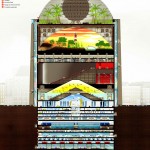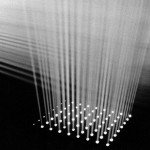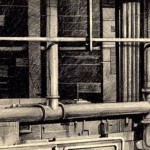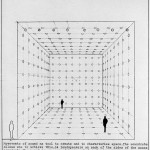From “Deux ou trois choses que je sais d’elle“, 1967 Jean-Luc Godard)
Excerpts from Wikipedia:
The film does not tell a story so much as a present an essay-like study of Godard’s view of contemporary life; Godard wrote that “I wanted to include everything: sports, politics, even groceries. Everything should be put in a film.
Godard himself narrates the film in a whispered voice-over that discusses his fears to the audience about the contemporary world, including the Vietnam War. The film often cuts to various still shots of bright consumer products and ongoing construction.
Juliette lives in one of many supposedly luxurious high rises being erected in the banlieues (suburbs) of Paris. While meant to provide housing to families working in the growing capital during the prosperous post-war years, Godard sees the banlieues as the infrastructure for promoting a value system based on consumerism, a term he equates with prostitution itself: a consumerist society, he explained during a debate on the Oct. 25, 1966 edition of Zoom, demands a work force living in regimented time and space, forced to work jobs they don’t like, “a prostitution of the mind.”
Around the time he was making the film, Godard appeared on the television program Zoom to debate with government official Jean St. Geours, who predicted that advertising would increase as the basic impulse of the French society at the time was to increase its standard of living. Godard explained that he saw advertisers as the pimps who enslave the women to the point where they give their bodies without compunction because they’ve been convinced what they can buy has more potential to bring happiness than enjoying sex in a loving way.













be’, però il film era veramente brutto. e mortalmente palloso.
Si, lo dice anche mb, che era palloso, io non l’ho visto. Però queste due tre scene sono spettacolari.
Visti caché e white ribbon di haneke. Non ne abbiamo mai parlato.
meh il primo, bellissimo il secondo.
poi ne parliamo più nel dettaglio, ma bene o male questo è il succo.
a me è piaciuto moltissimo anche il primo. Ci ho messo un po’, ma credo dipenda proprio dal suo essere incompleto, non finito.
Ho appena letto che ha anche realizzato una versione del Castello di Kafka, per la televisione.